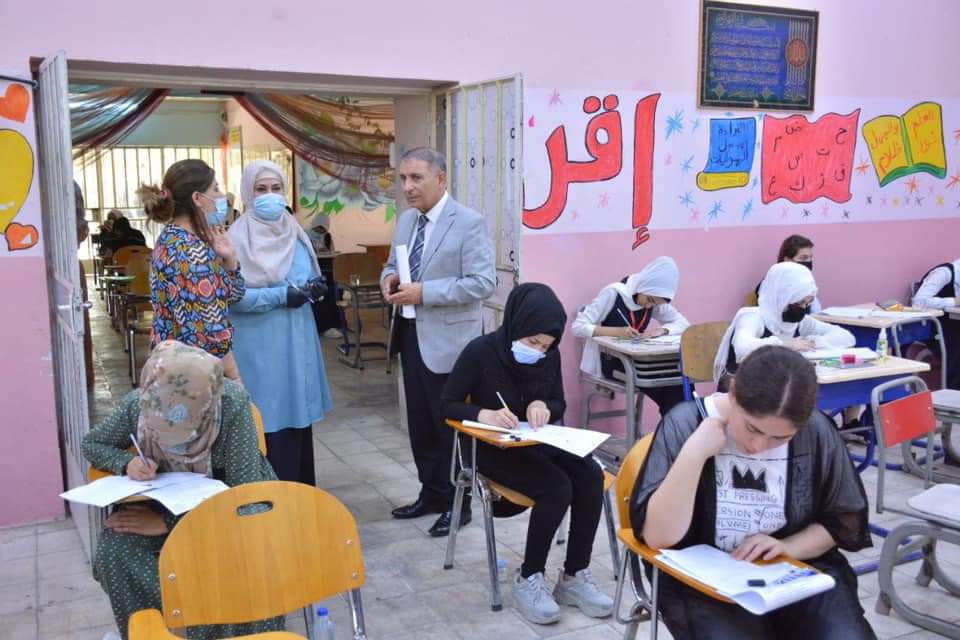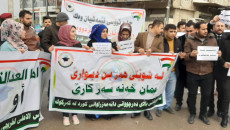Tens of halls for class nine final exams complain of lack of air conditioning in the exam halls in the middle of baking summer while local officials say the warehouses are full of air coolers and conditioners.
On August 1st, 39,000 students of class nine in Kirkuk headed to exam halls divided into 28 centers as the first day of exams all over Iraq except Kurdistan region while temperature passed 45 Celsius degrees.
“Only two fans were working. At 8 am, the power was down and the generator of the school was broken. Two students almost fainted more than once due to the hot weather,” Fatin Abid, a student of class nine took exam in Shahba school.
The teachers were passing cold water to the students to drink and wash up their faces, she added.
“It has really affected the performance of the students. Two of my smart students didn’t do well in the exams. It was the same for me.”
On Tuesday, August 3rd, the second day of the exams, the problem of cooling exam halls has not been solved.
“It was tough. We were sweating and hardly could breathe.”
“There were 8 air coolers (Mubarida) but none of it was switched on. I really don’t know what was the reason because power was on,” said Pola Ali, pupil of class nine who took exams in Haji Qader Koi shool.
“It was tough. We were sweating and hardly could breathe.”
The problem was reported in most of Kirkuk exam halls and all were blaming Kirkuk directorate of education.
Mohammed Jalil, teacher and observer of the final exams,” in a high school said cooling has caused a big problem in exam halls. “Some halls have colling system but they do not use it. There should have been preparations.”
Jalil said he has talked to his colleagues in other exam halls whom had the same problem.
“They told me there were cases of fainting among the students. Some halls have not provided even drinking water. These issues have to be addressed soon.”
The northern oil-rich city of Kirkuk, Iraq’s second largest reserves, pumps out three million barrels of crude oil a month marketed for over 200 million American Dollars
Located 238 kilometers north of Baghdad, Kirkuk is an ethnically mixed province for 1,2 million Kurds, Sunni and Shiite Arabs, and Turkmen. It has long been at the center of disputes between Baghdad and the Erbil.
The province misses proper utilities of power supply, drinking water, garbage collection, and basic health care and education system badly hurt by corruption and long years of war and instability.
“We have no idea which hall has no coolers. It’s the principals of exam halls whom should have informed us how many coolers they need,” said Jassim Assaf, manager of exams’ department in Kirkuk education.
“They still can contact us and we can provide their needs. There are coolers and all other needs in the warehouses of Kirkuk education so if not for such a day, when we are going to use it?” he added.
“Any hall needs cooler, let them ask for it.”
Teachers used to attend schools four hours a day on average ahead of Covid-19 pandemic which brought in online education for the first time in the history of education in Iraq.
Iraq’s education infrastructure is in ruins in many parts of the country; one in every two schools is damaged and needs rehabilitation, a report by UNICEF about education in Iraq says.
A number of schools operate in multiple shifts in an attempt to accommodate as many students as possible, squeezing the little learning time that children have.
Moreover, recent growth in the total number of teachers, the number and share of qualified teachers in Iraq has decreased at all educational levels, with the exception of pre-school, the UNICEF reports.






